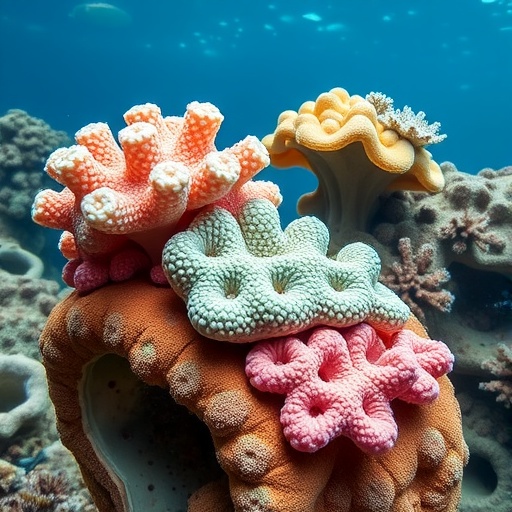Coral reefs, often referred to as the rainforests of the sea, are vital ecosystems that support a staggering diversity of marine life. They provide essential services such as coastal protection, habitat for marine species, and even boost local economies through tourism and fisheries. However, the health of these ecosystems is declining at an alarming rate due to climate change, pollution, overfishing, and habitat destruction. The urgent need to restore coral reefs has sparked innovative research aimed at finding effective, cost-efficient solutions for coral settlement substrates. A recent study published in the journal “Coral Reefs” addresses this pressing issue, shedding light on the future of coral restoration.
The study, authored by Widiastuti and colleagues, explores various materials that can be utilized as coral settlement substrates. The researchers emphasize that facilitating coral larval settlement on these substrates is a crucial step in the restoration process. Larval settlement directly influences the success of new coral growth and the overall recovery of degraded reefs. Therefore, understanding which materials are most effective for attracting coral larvae is fundamental for future restoration efforts.
One of the key findings of the study is the identification of cost-effective materials that can be used to promote coral settlement. Traditional substrates often used in restoration projects can be expensive and resource-intensive. The research team synthesized a range of alternative materials, assessing their efficacy in attracting coral larvae, as well as their affordability. This shift towards using cost-effective options is crucial, especially in regions where funding for coral restoration projects is limited.
In their experimentation, researchers employed several innovative materials such as ceramic tiles, concrete, and various natural substrates. Each material’s surface characteristics significantly impacted how well coral larvae adhered to them. The study revealed that porosity, surface roughness, and biofilm development on these materials played pivotal roles in attracting coral larvae. This highlights the intricate relationship between substrate properties and coral settlement success.
Interestingly, the group also investigated the potential of artificial substrates combined with natural elements. By incorporating features that mimic the conditions of natural reefs, researchers were able to enhance settlement rates significantly. The presence of microhabitats and a diverse array of textures on the substrates could provide ideal conditions for coral larvae, facilitating their attachment and growth.
Another critical aspect of the study was the evaluation of substrate durability. For a settlement substrate to be successful in coral restoration, it must also withstand harsh marine environments. Researchers conducted long-term assessments to determine how different materials fared over time, particularly against factors such as wave action, sedimentation, and biofouling. This understanding of material longevity is essential to ensure successful coral growth and reef restoration.
The implications of this research extend beyond just coral restoration. Insights gained from these findings can be applied to other marine conservation efforts as well. The study emphasizes the importance of a multifaceted approach to reef restoration: one that combines innovative substrate design with ecological understanding. By fostering partnerships among scientists, policy-makers, and local communities, the full potential of these methods could be realized.
One noteworthy component of the research was its focus on the scalability of these restoration efforts. While many innovative approaches may work well in controlled environments or small-scale projects, the study assessed how these cost-effective substrates could be deployed effectively on larger scales. The long-term vision of the team is to create a comprehensive strategy that can be implemented globally, benefiting coral reefs in regions facing imminent danger.
Moreover, public involvement and education are critical to the success of coral restoration initiatives. The research underlines the importance of community engagement in conservation efforts. By educating locals about the role of coral reefs and the significance of using these innovative substrates for restoration, communities can become active participants in preserving their marine environments. This grassroots approach not only promotes awareness but also ensures that restoration projects are sustained in the long run.
The findings of this study may very well revolutionize the way we approach coral restoration. As more and more coral species face critical threats, prioritizing cost-effective and efficient strategies for their recovery becomes imperative. The potential benefits of these substrates on coral settlement can drive significant advancements in marine conservation, offering hope for the future of global coral reef biodiversity.
As the world’s oceans continue to face unprecedented challenges, research such as this is essential for combating the decline of coral reefs. The cost-effective materials explored by Widiastuti and her team not only present new avenues for restoration but represent a collective call to action for scientists, conservationists, and the public alike. Time is of the essence, and embracing innovative strategies may ultimately determine the fate of these vital ecosystems.
The significance of this study reverberates beyond academic circles; it addresses urgent ecological concerns while paving the way for practical applications of scientific research in real-world scenarios. The restoration of coral reefs not only helps safeguard marine biodiversity but also ensures the vitality of economies that depend on healthy ocean ecosystems. In a time where urgency is paramount, embracing every opportunity to revive and strengthen coral reefs takes on unprecedented importance.
As restoration efforts around the globe gain momentum, the importance of cost-effective coral settlement substrates should not be underestimated. Future research must continue to expand upon these findings, generating new knowledge and strategies that will drive successful conservation efforts. The landscape of coral restoration is changing rapidly, and embracing scientific innovation and collaboration could very well lead to a brighter, more resilient future for our planet’s marine treasures.
Subject of Research: Coral Settlement Substrates for Restoration
Article Title: Cost-effective Coral Settlement Substrates for Restoration, Exports and Research
Article References:
Widiastuti, Wijaya, A.A.N.A.I., Giuliano, C. et al. Cost-effective coral settlement substrates for restoration, exports and research. Coral Reefs (2025). https://doi.org/10.1007/s00338-025-02750-6
Image Credits: AI Generated
DOI:
Keywords: Coral reefs, restoration, substrate materials, marine conservation, larval settlement, ecological approach, community engagement.




